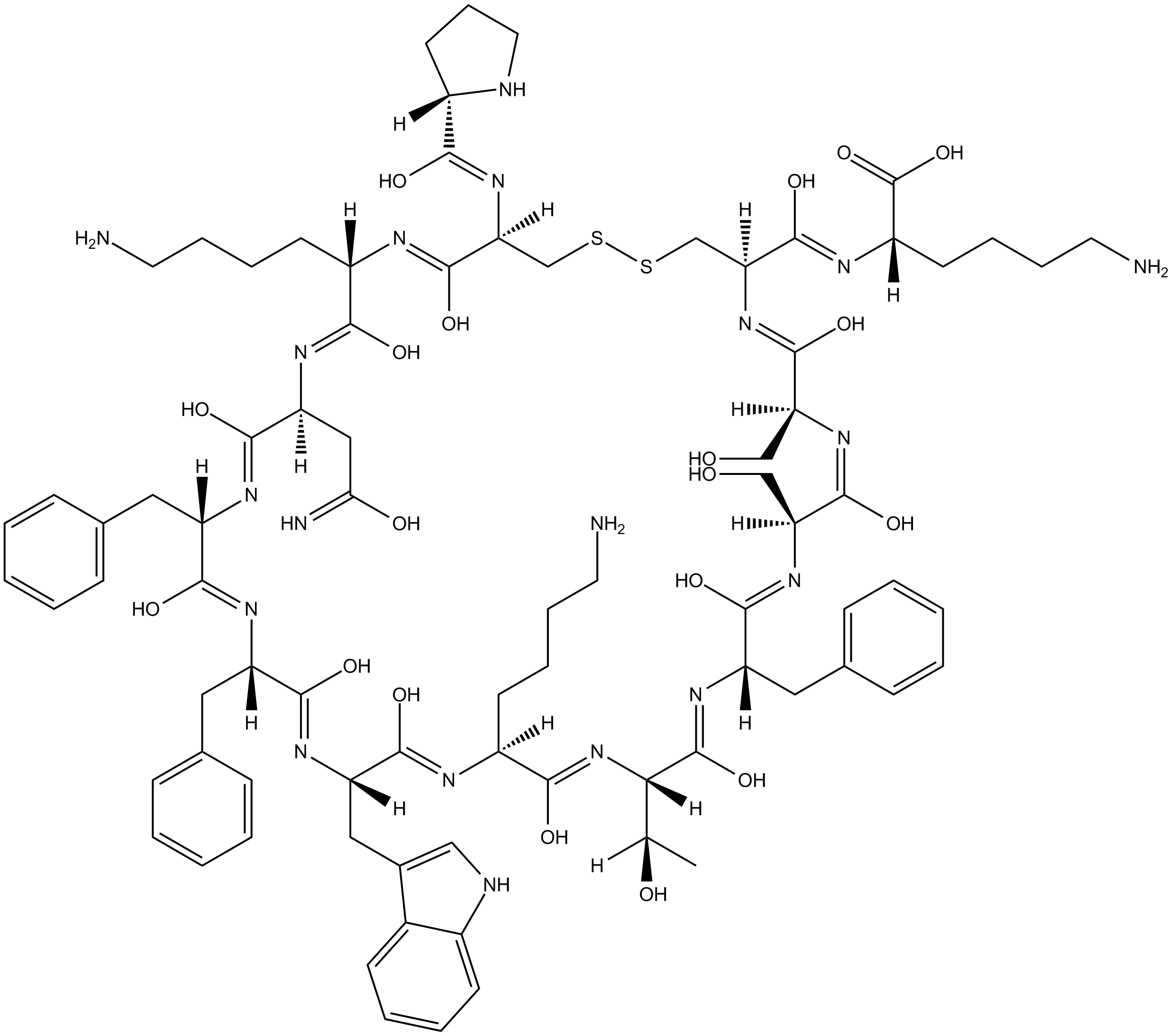Cortistatin 14 (Synonyms: CST-14, human, rat) |
| Catalog No.GC12835 |
Cortistatin 14 (CST-14, human, rat), a neuropeptide with neuronal depressant and sleep modulating properties, can bind to all five cloned somatostatin receptors (SSTRs) and ghrelin receptor to exert its biological activities and co-exists with GABA within the cortex and hippocampus.
Products are for research use only. Not for human use. We do not sell to patients.

Cas No.: 193829-96-8
Sample solution is provided at 25 µL, 10mM.
Cortistatin-14 is an endogenous neuropeptide agonist of somatostatin receptors (IC50s = 0.5-18.2 nM for human SST1-SST5 receptors expressed in CCL39 cells).[1],[2] It is expressed in GABAergic interneurons in the cortex and hippocampus.[2],[3] Cortistatin-14 competitively inhibits hexarelin binding to human growth hormone secretagogue receptors (GHS-R) in pituitary membranes (Ki = 0.54 μM).[4] It also activates the human Mas-related gene receptor MrgX2 expressed in HEK293 cells leading to quantifiable GTP-γS binding to the G protein subunit Gαο (EC50 = 1.3 μM).[5] Cortistatin-14 (0.01-1 μM), similarly to somatostatin-14, completely inhibits thyrotropin-releasing hormone, and partially inhibits vasoactive intestinal peptide, stimulation of cAMP production in GH4 cells.3 In mice, cortistatin-14 dose-dependently (0.05-5 μg, i.c.v.) impairs memory retention when administered after foot shock avoidance training.[6] Cortistatin-14 (40-320 μg/kg, s.c.) dose-dependently reduces growth hormone secretion in rats by greater than 80% after 10 minutes when administered at doses of 40-320 µg/kg.[7]
Reference:
[1]. Criado, J.R., Li, H., Jiang, X., et al. Structural and compositional determinants of cortistatin activity. J. Neurosci. Res. 56(6), 611-619 (1999).
[2]. Spier, A.D., and de Lecea, L. Cortistatin: A member of the somatostatin neuropeptide family with distinct physiological functions. Brain Res. Brain Res. Rev. 33(2-3), 228-241 (2000).
[3]. de Lecea, L., Criado, J.R., Prospero-Garcia, O., et al. A cortical neuropeptide with neuronal depressant and sleep-modulating properties. Nature 381(6579), 242-245 (1996).
[4]. Deghenghi, R., Papotti, M., Ghigo, E., et al. Cortistatin, but not somatostatin, binds to growth hormone secretagogue (GHS) receptors of human pituitary gland. J. Endocrinol. Invest. 24(1), RC1-RC3 (2001).
[5]. Burstein, E.S., Ott, T.R., Feddock, M., et al. Characterization of the Mas-related gene family: structural and functional conservation of human and rhesus MrgX receptors. Br. J. Pharmacol. 147(1), 73-82 (2006).
[6]. Flood, J.F., Uezu, K., and Morley, J.E. The cortical neuropeptide, cortistatin-14, impairs post-training memory processing. Brain Res. 775(1-2), 250-252 (1997).
[7]. Deghenghi, R., Avallone, R., Torsello, A., et al. Growth hormone-inhibiting activity of cortistatin in the rat. J. Endocrinol. Invest. 24(11), RC31-RC33 (2001).
Average Rating: 5 (Based on Reviews and 5 reference(s) in Google Scholar.)
GLPBIO products are for RESEARCH USE ONLY. Please make sure your review or question is research based.
Required fields are marked with *




